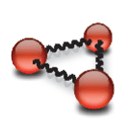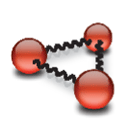New place to search for Efimov states
Tractable three-body problems are rare, which is why Vitaly Efimov’s study in proposing that bound states could exist between three interacting bosons was so intriguing. It took more than years, though, to observe Efimov states in an ultracold gas of cesium atoms, in which interactions could be controlled with a magnetic field. Now, writing in Physical Review Letters, theorists suggest similar states should also exist between dipolar molecules.
In his prediction, Efimov assumed the interacting bosons were spherically symmetric. In their new work, Yujun Wang and colleagues at JILA, at the University of Colorado, Boulder, use numerical methods to look for bound states between molecules that have an electric dipole—an extended structure that greatly complicates the calculations. The group shows that such dipolar Efimov states are in fact long-lived and “universal,” meaning they don’t depend on the molecules’ detailed structure. (The states only exist when the separation between the molecules is large compared with the length of their dipole moment.)
Wang et al.’s prediction is timely, as it is only in the last two to three years that experimentalists have been able to cool the molecules in a gas to their absolute ground state and study and manipulate the dipole interactions between them. – Jessica Thomas





